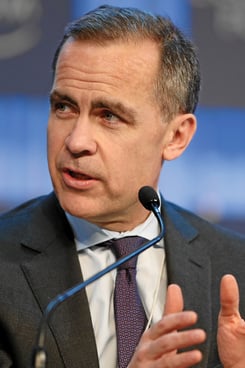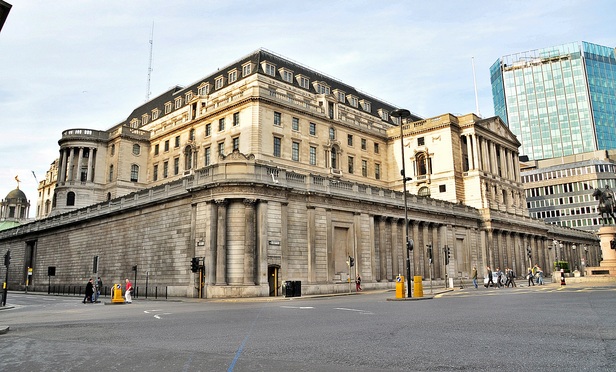Bank of England's average annual legal spend more than triples
Bank's average spend on external counsel rises to almost £7m during the past three years
March 20, 2017 at 06:49 AM
3 minute read
The Bank of England's (BoE) average annual legal spend has more than tripled during the past three years, figures obtained by a freedom of information request have revealed.
From 2011 to 2013, the BoE's annual legal spend was £2m per year, but for the three subsequent years, the average figure has risen to almost £7m.
The bank spent £4.7m on external counsel in 2014, followed by £8.7m in 2015 and £7.4m in 2016.
One major contributor to the bank's recent legal spend has been the 2014 inquiry into the extent of its involvement in the foreign exchange market scandal. Travers Smith and One Essex Court's Lord Grabiner QC led the investigation, which racked up total costs of £2.9m, eventually exonerating bank officials from claims they were involved in or were aware of rate rigging. Travers was paid £2.2m for its work, with Lord Grabiner QC receiving £401,000.
The increase has also been driven by the UK's overhaul of financial regulation in 2013, which handed the BoE increased responsibility for the financial stability. The break-up of the Financial Services Authority (FSA) in 2013 led to the creation of the Financial Conduct Authority (FCA), the Prudential Regulation Authority (PRA) and Financial Policy Committee (FPC), with the latter two falling under the BoE's remit.
A source close to the BoE said: "The fact is, the bank is now an extraordinarily different animal with extraordinarily different statutory responsibilities."
 The expansion of the bank's regulatory remit coincided with the 2013 appointment of governor Mark Carney (pictured), who took up the role after five years as governor of the Bank of Canada.
The expansion of the bank's regulatory remit coincided with the 2013 appointment of governor Mark Carney (pictured), who took up the role after five years as governor of the Bank of Canada.
A source close to the bank said: "The influence of Mark Carney has also had an effect [on legal spend]. He does not come from a culture that finds law a nuisance – instead, he places a lot of emphasis on legal analysis before the event."
The size of the BoE's in-house legal department has risen significantly in the past three years, growing almost 50% from 46 lawyers in 2014 to 68 in 2016. This increase has come on the back of a number of additions to the bank's in-house legal team in recent years, including the PRA's regulatory action division, which handles investigatory and enforcement work.
The bank refused to disclose the amount it has spent on individual law firms in recent years, but it has historically used Freshfields Bruckhaus Deringer for its most significant legal work. The magic circle firm advised the bank last year on the economic shock of the Brexit vote, as well as the fallout from the Libor scandal in 2012.
In January 2013, Legal Week reported that Freshfields had received more than £14m in legal fees from the bank since March 2008. The second highest biller during that same period was Clifford Chance, with total fees of £1.4m, while other firms to have handled work for the bank include Travers, Bird & Bird and Kirkland & Ellis.
This content has been archived. It is available through our partners, LexisNexis® and Bloomberg Law.
To view this content, please continue to their sites.
Not a Lexis Subscriber?
Subscribe Now
Not a Bloomberg Law Subscriber?
Subscribe Now
NOT FOR REPRINT
© 2025 ALM Global, LLC, All Rights Reserved. Request academic re-use from www.copyright.com. All other uses, submit a request to [email protected]. For more information visit Asset & Logo Licensing.
You Might Like
View All
Clifford Chance, Milbank Steer Yondr Group’s $900M Debt Financing in Malaysia

Kirkland, Paul Hastings, White & Case, Freshfields advise on Top German Deals
2 minute read
Kirkland Steers Paris-based Antin in ‘Year’s Biggest’ Infrastructure Fund Closing, at €10.2B
3 minute read
Venezuela Faces Creditor Class Action Suit After Missing $1.5B Bond Payments
2 minute readTrending Stories
- 1US DOJ Threatens to Prosecute Local Officials Who Don't Aid Immigration Enforcement
- 2Kirkland Is Entering a New Market. Will Its Rates Get a Warm Welcome?
- 3African Law Firm Investigated Over ‘AI-Generated’ Case References
- 4Gen AI and Associate Legal Writing: Davis Wright Tremaine's New Training Model
- 5Departing Attorneys Sue Their Former Law Firm
Who Got The Work
J. Brugh Lower of Gibbons has entered an appearance for industrial equipment supplier Devco Corporation in a pending trademark infringement lawsuit. The suit, accusing the defendant of selling knock-off Graco products, was filed Dec. 18 in New Jersey District Court by Rivkin Radler on behalf of Graco Inc. and Graco Minnesota. The case, assigned to U.S. District Judge Zahid N. Quraishi, is 3:24-cv-11294, Graco Inc. et al v. Devco Corporation.
Who Got The Work
Rebecca Maller-Stein and Kent A. Yalowitz of Arnold & Porter Kaye Scholer have entered their appearances for Hanaco Venture Capital and its executives, Lior Prosor and David Frankel, in a pending securities lawsuit. The action, filed on Dec. 24 in New York Southern District Court by Zell, Aron & Co. on behalf of Goldeneye Advisors, accuses the defendants of negligently and fraudulently managing the plaintiff's $1 million investment. The case, assigned to U.S. District Judge Vernon S. Broderick, is 1:24-cv-09918, Goldeneye Advisors, LLC v. Hanaco Venture Capital, Ltd. et al.
Who Got The Work
Attorneys from A&O Shearman has stepped in as defense counsel for Toronto-Dominion Bank and other defendants in a pending securities class action. The suit, filed Dec. 11 in New York Southern District Court by Bleichmar Fonti & Auld, accuses the defendants of concealing the bank's 'pervasive' deficiencies in regards to its compliance with the Bank Secrecy Act and the quality of its anti-money laundering controls. The case, assigned to U.S. District Judge Arun Subramanian, is 1:24-cv-09445, Gonzalez v. The Toronto-Dominion Bank et al.
Who Got The Work
Crown Castle International, a Pennsylvania company providing shared communications infrastructure, has turned to Luke D. Wolf of Gordon Rees Scully Mansukhani to fend off a pending breach-of-contract lawsuit. The court action, filed Nov. 25 in Michigan Eastern District Court by Hooper Hathaway PC on behalf of The Town Residences LLC, accuses Crown Castle of failing to transfer approximately $30,000 in utility payments from T-Mobile in breach of a roof-top lease and assignment agreement. The case, assigned to U.S. District Judge Susan K. Declercq, is 2:24-cv-13131, The Town Residences LLC v. T-Mobile US, Inc. et al.
Who Got The Work
Wilfred P. Coronato and Daniel M. Schwartz of McCarter & English have stepped in as defense counsel to Electrolux Home Products Inc. in a pending product liability lawsuit. The court action, filed Nov. 26 in New York Eastern District Court by Poulos Lopiccolo PC and Nagel Rice LLP on behalf of David Stern, alleges that the defendant's refrigerators’ drawers and shelving repeatedly break and fall apart within months after purchase. The case, assigned to U.S. District Judge Joan M. Azrack, is 2:24-cv-08204, Stern v. Electrolux Home Products, Inc.
Featured Firms
Law Offices of Gary Martin Hays & Associates, P.C.
(470) 294-1674
Law Offices of Mark E. Salomone
(857) 444-6468
Smith & Hassler
(713) 739-1250









